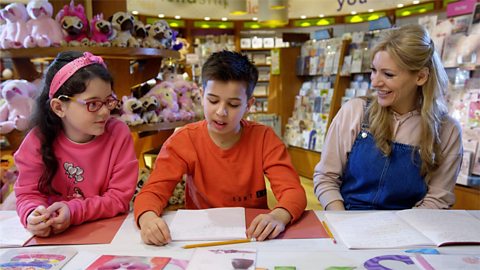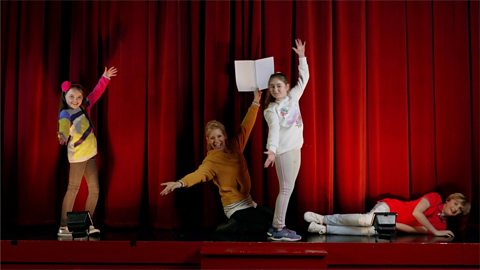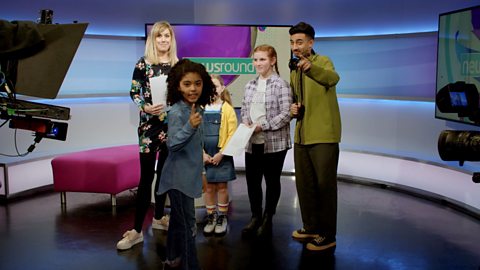Karim: Hey, and welcome to the studio!
Ava: Oi, Karim! Stop messing with the desk!
Karim: Alright Ava⊠I do a lot of DJing you know, its all good.
Karim: Simon gets it⊠see?
Karim: You might have guessed that we are in a recording studio! And I'm not going to lie, itâs a really cool set up. The guys are in the sound proof booth laying down some tunes that are being recorded through the microphone.
Karim: Just behind me is the mixing desk, which I'm not allowed to touch thanks to someoneâŠ
Karim: And thatâs where all the sounds are mixed and adjusted to bring the whole track together.
Karim: And you can do some really cool things with soundsâŠ
Karim: You can make them go higher,
Karim: you can make them go lower,
Karim: or you can change it completely!
Karim: And I know what you're wondering, what does all this music equipment have to do with creative writing? Well, let me tell you.
Karim: When you sing, or in my case try to sing your favourite song, what are you using? That's right, you're using words.
Karim: Those words are called lyrics and you need to be really creative to get those lyrics down.
Karim: But hey, let's see what the master has to say!
Karim: MEET THE MASTER!
Karim: Singer and songwriter Janet Devlin.
Janet: So youâve probably heard your teacher talking about things like metaphors, similes and maybe even personification.
Janet: And if you're like me you've probably thought to yourself, how on earth is this going to help me in my life?
Janet: I'm not the best with expressing my emotions but by using metaphors, similes and personification in my songwriting I get to be creative with my feelings.
Janet: If I wanted to write a song about the school holidays, I might be inclined to say school's out and I'm free.
Janet: But that's kind of boring, so let's add a metaphor.
Janet: School's out, I'm a free bird, school's out, I'm flying unheard.
Janet: That works! Let's see how it goesâŠ
Janet: School's out, I'm a free bird, school's out, I'm flying unheard.
Janet: So my challenge to you is to go away and write some lyrics for a piece of music.
Janet: But not just that, your master skill has to be using symbolic language.
Janet: What are you waiting for? Get creative!
Karim: Come on team, weâve got a challenge to complete. But first letâs tell these guys more about you.
Karim: First up, its Ava. She has a super creative imagination that's always working overtime.
Karim: This is Cormac, and he has a shape-shifting face.
Karim: Finally, its Tia who's super quick and super skilled on the draw.
Karim: I'm looking forward to this one! You will needâŠ
Karim: A short piece of instrumental music â there are two options available to download on the ±«Óătv Teach website.
Karim: A pen or a pencil,
Karim: and a piece of paper.
Karim: OK! First things first we're going to listen to the tune a couple of times through.
Karim: And sometimes guys it helps when you close your eyes whilst listening to the music, because it gives you loads of ideas.
Karim: And any of those ideas or images that pop Into your head are a great starting point.
Karim: So jot those down and they'll be useful later, sound good?
Karim: We ready? Let's do it!
Karim: When youâre writing lyrics to a tune itâs important that the words fit with the music. To do this we need to count out the beats to the music⊠in fact, why don't we do it all together?
Karim: So once we have the rhythm in our heads we can start adding the lyrics. Making the lyrics rhyme is also a really nice touch.
Karim: Do you wanna hear an example?
Children: YEAH!
Karim: I'm like an ice cube, yes I'm cold, I look really young but I am old!
Karim: WaaaaaaaâŠ
Karim: Right, we get the idea?
Children: YEAH!
Karim: Let's get writing!
Karim: Hey, should we see if Simon will record it for us?
Children: YEAH!
Karim: Come on then! Simon?
Cormac: One nil is the score to Liverpool, two nil, three nil, four, five, six, yo- yo!
Ava: Riding a unicorn to the Moon, feeling like a star!
Tia: Riding a unicorn to the Moon, feel like an alien⊠boom!
Karim: If you enjoyed this challenge there are loads more over on the ±«Óătv Teach website.
Karim: You can make a cake, produce an animation or even tell a story for Newsround.
Karim: So go on, get creative!
Video summary
This short film presents a real-world context for writing song lyrics and challenges children to write their own lyrics for one of two provided backing tracks.
Set in a recording studio, presenter Karim Zeroual and a group of children take on the challenge of creating their own song lyrics.
Our master songwriter â Janet Devlin â adds to the challenge by inviting the children to incorporate the âMaster Skillâ using symbolic language (simile, metaphor or personification).
With the support of Karim, the children are walked through the process of writing some lyrics for a piece of music.
They go through the process of listening to the music, drafting ideas and thoughts in response, counting beats to find rhythm, and creating sentences to fit rhythm.
The children then create songs and record them in the studio.
This short film is from the ±«Óătv series, Get Creative.
Teacher Notes
Click or tap to download instrumental music which can be used in the lyric writing challenge:
Before Watching
Talk to your pupils about their favourite songs. Encourage them to think about why they like that song.
What is it that makes them want to listen to it again and again? Get them to think about the words. Are there any words they really like singing? Why?
After Watching
This activity can be done either individually or as a piece of shared writing, in groups or pairs.
You may choose to present the Thinking Questions below to the children at this point.
Play pupils the piece of music a few times.
- First time, have the children just listen to the music.
- Second time, have them write down any thoughts, feelings or ideas the music conjures in them.
You may want to let the children share some of their ideas at this point.
Now, have the children work out the beats and rhythm of the piece, by clapping or tapping.
Give the children 10-15 minutes to turn their notes into lyrics. You may want to play the track in the background or let them focus without the music.
Play the track again and let the children practice their lyrics and make any changes. Consider giving the children time to share their lyrics with peers and take feedback.
When they are happy with their songs, why not record them or perform them for each other?
For an extra challenge invite children to incorporate the âMaster Skillâ.
Master Skill
- Use symbolic language â simile/metaphor/personification.
Share examples of each with children (there are many examples, use any that you think will connect with your students, here are a few ideas).
Simile:
- Like a Rolling Stone - Bob Dylan
Metaphor:
- Baby Iâm a Firework - Katy Perry
Personification:
- Mr Blue Sky - Electric Light Orchestra
Pull out an example of metaphor/simile from song lyrics and discuss how comparison helps the writer make a point in an imaginative way.
Now give the children some examples of song lyrics with similes/metaphors in them and ask them to underline in colour all the similes or metaphors or personification they can find.
Thinking Questions:
- What am I trying to say with this song?
- How can I express my thoughts/feelings/ideas in an interesting way?
- Which words do I want to repeat as a chorus/hook?
- Is there an image I can use to symbolise thoughts/ideas/feelings?
Supported Learning and SEN
As writing song lyrics is predominantly an oral task, it is ideal for children who may struggle with the written word. When working with these children you can avoid having the lyrics written down at all and opt to perform or record their creations.
Depending on the ability of your students, you may want to offer more support. Here are some ideas of how to do that:_
- Allow the children to work in pairs/groups.
- Provide adult/peer support to scribe or note down ideas.
- Give pupils a recording device to use instead of notes.
- Suggest that pupils use repeating lyrics as in a chorus.
- Provide a support sheet with pictures or ideas as inspiration.
- Donât push for symbolic language for those.
Extend this Activity
Make a music video of one/all of the songs to share on school website. You can do this by taking on the Create a Stop Motion Animation challenge in the Get Creative series.Create longer versions of the films.
Produce an album of songs (sell for charity or upload on school website)Organise a live event to perform the songs (assembly, celebration day)Use this experience to springboard into another type of creative writing (write a story based on the theme/character of song, write a news report of the album release, create a âHow Toâ booklet for writing a song).
Curriculum Notes
This short film is designed to support the teaching of creative writing for KS2 in England, Wales, Northern Ireland and for 2nd level in Scotland.
In England, the video offers a chance for pupils to write with purpose in context, using the skills of notation and editing whilst also providing the opportunity to read work aloud and work towards mastery through developing specific key skills.
In Wales, the video provides an opportunity for pupils to write creatively with chances to adapt their writing for purpose, use a range of language skills, note ideas and plan their writing then reflect, redraft and improve their work.
In Northern Ireland, the video gives pupils the opportunity to participate in independent or group writing, select, plan and adapt their writing for purpose, express thoughts and feelings through their imaginative compositions, experiment with language and practise the skills of revising and redrafting their compositions.
In Scotland, the video presents pupils with an example of contextual writing to explore, from which they can create their own pieces of writing from notes, use appropriate vocabulary, language and style to engage their reader and check their writing for sense and purpose.
Write a poem. video
In this short film for primary schools, Naomi Wilkinson and a group of children are challenged to write a poem for someone they know.

Write a script. video
Naomi Wilkinson challenges a group of children to write a short script for a TV show.

Create a story. video
A visit to the Newsround studio presents real-life context for telling a story and a challenge for children to tell a story as a short news report.
